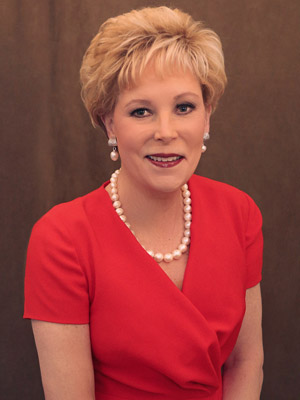
Dr. Diane McNulty, Jindal School associate dean for external relations and corporate development, is being honored Feb. 23 by the Dallas chapter of the American Heart Association at its annual Go Red For Women Luncheon.
McNulty, a survivor of a congenital heart defect, will receive the Sandi Haddock Community Impact Award for her role as a female leader who has significantly improved the health of women in the community.
Support for her own health challenges has fueled McNulty’s passion and work on behalf of the American Heart Association for almost 30 years. With her friend Ann Dyer — a Dallas businesswoman she has known since college — McNulty co-founded the Game of Hearts, a luncheon fundraiser, and the AHA’s Women’s Heart Guild, a forerunner of the Go Red for Women movement, which advocates for more research and swifter action for women’s heart health.
She also has served on the Dallas Division AHA Board of Directors, and she chaired the 2001 Côtes du Coeur ball, the largest American Heart Association fundraiser in the country.
“Diane’s unwavering dedication,” the Go Red for Women Luncheon invitation says, “has resulted in millions of dollars raised for the American Heart Association to fund lifesaving research, education and advocacy impacting the entire Dallas community.”
“Before I knew about the American Heart Association, it was there for me,” McNulty says. “The association has funded many breakthroughs saving countless lives — like mine.”
According to the AHA, “up to 1.3 million Americans alive today have some form of congenital heart defect. In the United States, about 36,000 children are born with a heart defect each year. At least nine of every 1,000 infants born each year have a heart defect.”
The exact cause of most heart defects is unknown, the AHA says, which is why they are under investigation. Among advances made in this area, the association reports, is “pulse oximetry screening, a low-cost, highly effective, and painless bedside test for newborns that can be completed in as little as 45 seconds at less than $4 per baby.”
“They estimated I would live about five years, but because of the work of the American Heart Association, I surpassed expectations,” McNulty says.
She also credits her late father, internist Dr. Frank O. Seay, for his unending quest to put the best doctors and latest innovations to work on her behalf. “He took me all over the country when I was 11,” McNulty recalls, “to find someone to operate on me.
With zeal similar to her father’s, McNulty says, “the AHA’s funding of research and public education has led doctors and surgeons to try innovative new ways to save the lives of those affected by heart disease.”
